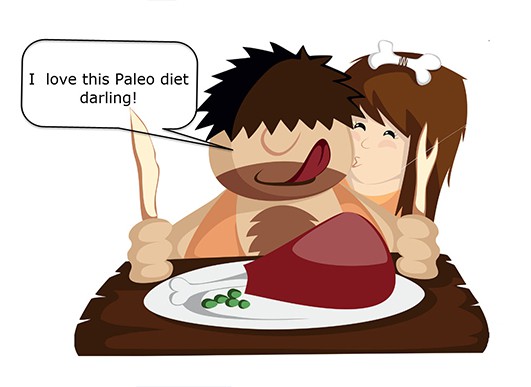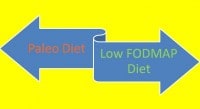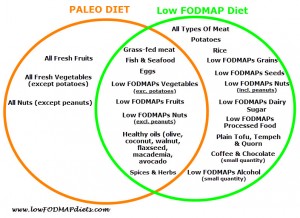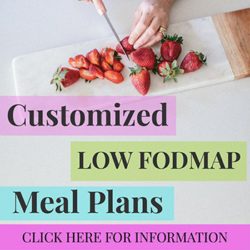Low FODMAP and Paleo Diet, let’s clear some points out.
With a myriad of diet options coming out every few months, it is often all too easy to be overwhelmed, not knowing which diet is best for your particular situation. With this post I am trying to clear up some of the confusion that seems to surround two diets that I am growing familiar with and that in the past few years, have become really popular, the Paleo diet and the low FODMAP diet.
While there are some people who would associate a low FODMAP diet with the very fashionable Paleo diet (which takes its name from the Paleolithic period and it’s also sometimes referred to as the Caveman diet), generally speaking the two diets are intrinsically different from each other.
Let’s see what are the basic differences and see if the Paleo Diet could be suitable for IBS sufferers.
What is a low FODMAP diet?
The FODMAP diet has been found to be significantly important in the treatment of Irritable Bowel Syndrome (IBS) symptoms. FODMAP stands for Fermentable Oligo-Di-Monosaccharides and Polyols, and describes a certain type of carbohydrate found in some foods. Food that is high in FODMAPs (including normally healthy vegetables and fruits) cause problems in the body by creating prime conditions for fermentation in the gut. This leads to the familiar bloating and discomfort that usually accompanies IBS.
Doctor Sue Shepherd, Monash University in Melbourne and King’s College London are the main sources of my low FODMAP diet research.
-This blog goes into details of my experience with this diet and the positive effects on my IBS, feel free to read some of the other posts, if you want to know how I am dealing with this.-
What is the Paleo diet?
Already known in the 1980’s the Paleo diet was left, for a couple of decades, in the shade of the more trendy Atkins, Zone and South Beach Diet, until the early 2000’s when Dr Loren Cordain published the best sellers book ‘The Paleo Diet’; from there onwards its popularity grew and grew and in 2013 the Paleo Diet was the most researched weight loss method, in the Google search engine.
The Paleo Diet: Lose Weight and Get Healthy by Eating the Foods You Were Designed to Eat
The Paleo Diet is about cutting out any food that would not have been available to our stone age ancestors, on the premise that our DNA has not adapted to recent changes in our diet.
According to Dr Cordain by adopting a Paleo diet, which is a high protein and high fiber diet, people could enjoy a better general health and also significantly reduce the risk of heart diseases and type 2 diabetes, as well as weight loss (if needed), improved athletic performance, help with better sleep, elimination or reduction of acne and even increased libido.
Are these diets restrictive?
Both diets are fairly restrictive; there is a very clear list of foods to be avoided for each one. With the low FODMAP you do restrict certain individual foods, but there is still a large list of allowed foods, including some processed food. By contrast, the Paleo diet cuts out whole food groups, plus all processed foods. The general consensus is that, with Paleo, if it has an ingredients list, it is off the menu.
For my research I have consulted many sites and I have found various versions of the Paleo diet, some seemed a bit less restrictive than others, in term of food choice.
In brief what makes the Paleo diet different?
Most people, in the western world, have a diet full of refined and processed foods. According to the Paleo Diet, our bodies just aren’t genetically designed to break down these new, chemically altered foods. So the diet claims that, if we only consume food like lean, grass-fed meats together with fruits, vegetables and nuts, our bodies are able to process them more efficiently.
The principle is to eliminate these food groups:
- Cereal grains
- Legumes (including peanuts)
- Dairy
- Refined sugar
- Potatoes
- Processed foods
- Salt
- Refined vegetable oils
Some nutritionists are against this diet, affirming that it is not promoting good health and explaining that since the paleolithic time, 10,000 years ago, the human species has adapted and evolved to become flexible eaters and therefore it is ok to eat grains, dairies and seeds.
It would take me many thousands words to talk about the Paleo diet in-depth, the pros-the cons, the controversy surrounding this diet, but this is not the aim of my post, as I mainly want to talk about the differences and the things in common between low FODMAP diet and Paleo diet. For this reason I have created the below diagram, which visually helps me to understand the groups of food that the two diets have in common. It is pretty self-explanatory, the food in the middle section of the circles, represent the food that is ‘accepted’ by both diets.
-The low FODMAP diet information has been taken from the Monash University iPhone app and the information on the Paleo Diet food has been taken from Dr Cordain website.–
Can I use Paleo recipes on FODMAP?
If you stick to the food in the middle of the diagram, you could use the same recipes for either the Paleo or low FODMAP diet. For example, you can make zucchini (courgettes) noodles with a julienne peeler, and you have the perfect substitution for spaghetti or noodles. There are hundreds of meat and fish recipes with side vegetables, that can be adapted to make a healthy Paleo and low FODMAP meal.
So which diet is right for me?
It seems that most Paleo dieters choose this diet for weight loss, while the low FODMAP diet is predominantly chosen by individual suffering from Irritable Bowel Syndrome, to help them with those horrible symptoms brought by IBS.
For an IBS sufferer to follow a Paleo diet, it would mean sticking to those food that are in the middle, common section of the above diagram. This diet would be more restrictive than the Paleo Diet and the low FODMAP diet, as it only includes food that are ‘accepted’ by both diets. You don’t need to be a health expert to realise that this may take a lot of important nutrients out of your diet and common sense tells me that it would be wise to consult a dietitian, before attempting that.
Saying that, in my opinion, a lot of the food that is allowed in the low FODMAP diet is not necessarily healthy, I refer to the processed food, which may be safe in term of FODMAPs and may help IBS sufferers, but as we know processed food is not a healthy choice.
As most people with IBS, I haven’t chosen a low FODMAP diet as a weight loss diet, but naturally by eliminating a lot of the ‘bad’ food and learning to cook healthy food from scratch, I have also lost some weight. The main thing for me is that this diet helps me incredibly in managing my IBS symptoms.
For those who have followed my blog, you know that I have given up my earlier diet, who consisted of a lot of pasta (I’m Italian after all) and a lot of vegetables and fruits which I used to consume every day, but which were high in FODMAPs. I had to do it because of my IBS, it took a few months to adjust, but now I have no regrets and it is working for me.
After reading so much about Paleo diet, I am now considering adapting it to a ‘clean’ low FODMAP diet for a while and having more low FODMAPs veggies and lean meat/fish food and drastically reduce unhealthy food choices like gluten-free/low fodmap bread, pasta and other processed food . I will still have the healthy food in the low FODMAP section (brown rice, quinoa, oats etc.), which are not Paleo approved. I believe this should help me to feel even healthier, lose more weight and feel more energetic.
Keep following and I will keep you update on the progress.
Until next time I wish you all the best and take good care.
xo
Larah
References:







I have have IBSD I have tried everything short of just not eating. I was on the fodmap diet and found that I had to remove most of what was on there. I think I will try the Paleo diet and see how it works for me. I can’t get threw a meal before I have to go to the restroom. I’m so sick of that. Thanks for all the information.
Hi Ericka, an IBS specialised dietitian should be able to guide you with your food intolerance. Unfortunately the low FODMAP diet does not work for everybody, but it is still the best diet for IBS with over 75% success rate. Have you done the elimination phase correctly? Before doing the elimination most food made me go over the threshold, but now I can have almost amything in small quantities here and there, because I am under the threshold most of the time. Here is an article that may be of help: https://www.lowfodmapdiets.com/ibs-diet/
Please let me know how things are. I wish you all the best for now. xo Larah
Have you been tested for intestinal parasites? Just as an option. D.Fragilis is a nasty one I know all about! Many IBS symptoms.
Thanks Larah. Very informative writing in a compact form. I was recommended FODMAP due to ISB and was doing related research.
Thanks for your comment Rami. I hope the low FODMAP diet will help you too. Feel free to ask, I am happy to help, if I can.
The low FODMAP Diet is the right diet for IBS, not the Paleo diet.
I appreciate your comment.
Thanks for the clear and intelligent presentation here. Really helped me. I have been suffering for years it seems, and have recently been diagnosed with IBS. It seems that everything I’ve been doing has made it worse. Now I know why. Applesauce is a bad idea! Prunes are a bad idea! Onion in almost every meal …. lots of mushrooms. Eeeek. I’m going to try a strict FODMAP diet to see if I can stop spending every moment afraid that my digestive system is going to wreck my day/week/life.
Hi Patsy, thank you for your message. I did exactly the same before being diagnosed with IBS, I wanted to eat healthy and made myself these big pots of soups with onion, garlic, broccoli, cabbage and then wonder why I felt so sick as I mainly ate really healthy food. Now we know that the low FODMAP diet is the right diet for IBS. All the very best to you.
The Paleo diet has been around for some time. I think it is more about controlling carbs as a whole rather than only focusing on certain ones. I ate this type of diet for a few weeks and had no energy. I just could’t take the sluggishness. I actually lost 15 pounds in those 3 weeks which was shocking. I think the low FODMAP one is easier and more geared for IBS than just general stomach issues.
I’m glad you found this article useful Heather. I wrote it because a few people were asking me about the differences and also I read in a few IBS forums that some sufferers wanted to give it a go (most of them hadn’t heard about low FODMAP diet and thought that by eating Paleo their IBS symptoms would improve).
Love your clear and concise explanation of the difference between these two diets! It’s so interesting how trendy these diets get…I had heard of the Paleo diet but not the FODMOP–now I’m curious to learn more about it.